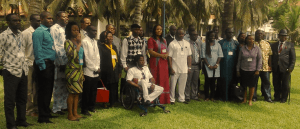Multi-stakeholder forum on Africa’s security underway in Accra

Stakeholders working in the areas of peace and security are dialoguing to find home-grown African solutions to the growing insurgency on the continent.
The Institute for Peace and Security Studies (IPSS) of Addis Ababa University in Ethiopia and the West Africa Network for Peace-building are facilitating the organisation of the pre-event dialogue in Accra.
The discussion comes ahead of the main forum scheduled in the Ethiopian city of Bahir Dar in April, christened; Tana High-level Forum on Security in Africa.
The theme for the upcoming Fourth Tana Forum Conference is: “Secularism and Politicised Faith.”
Mr Chukwuemeka Eze, Executive Director of the West Africa Network for Peace-building, said the dialogue was at a time states and citizens were at crossroads considering the present peace and security threats in West Africa.
He said the reemergence of faith and religious beliefs at the heart of contemporary conflicts, fuelled by politics, ethnicity and parochialism, was a challenging and worrisome development.
Therefore, he said: “If we continue to sing the chorus of solution to African problems then we must continue this king of engagement that enables us to reason together as a people with one common agenda and to deliberate on the best strategies to respond to our internal challenges.”
Mr Eze said religion was only a cover for the normal interest based politics of greed and power, adding that religion was not only exploited in war, but also genuinely drives war and in some instances regarded as the underlying value and currency that stimulates most conflicts.
“It gives room for irrational ideologies and perspectives that are often rationalised and justified with the realm of dogma,” he added.
He underscored the importance of the open dialogue and communication across segments to raise people’s awareness and to deflate seemingly hard-to-solve problems.
Dr Kidane Kiros, Director of IPSS, said despite the remarkable growth and transformation taking place in Africa, politicised faith, organised crimes, maritime security threats, terrorism and cyber-crime threatened the continent’s aspiration of a better future.
He said those threats, coupled with the scourges and residues of conflicts, were the newly emerging security risks thwarting the continent’s dream of a prosperous future and, therefore, required Africans’ prompt, co-ordinated and concerted efforts.
He said recent events such as the violent reactions in Niger to perceived actions of the French satirical magazine Charlie Hebdo, the kidnapping of young girls by militant group Boko Haram, and the postponement of elections in Nigeria due to security fears had brought issues of secularism and politicised faith to the public spotlight.
Dr Kiros said research showed that some two in three Africans strongly identified themselves with some sort of organised faith or religion and two in five Africans wanted some sort of religious involvement in the matters of the state.
But the quest by many states to achieve secularism and keep politicised faith in check is more complex than their violent manifestation on both traditional and new media, he added.
Tana high level forum on security in Africa is an informal gathering of personalities from across Africa including former heads of states and governments.
Senior officials and diplomats, scholars, religious leaders, representatives of continental and regional organisations, community associations and non-governmental organisations working in the peace and security areas, also take part in the forum.
Former President of Nigeria, Olusegun Obasanjo, chairs the Tana Forum with Thabo Mbeki as one of the members.
Source: GNA
